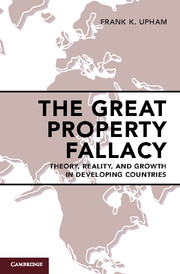Crossref Citations
This Book has been
cited by the following publications. This list is generated based on data provided by Crossref.
2018.
BOOKS RECEIVED.
The Cambridge Law Journal,
Vol. 77,
Issue. 2,
p.
439.
Green, W. Nathan
2019.
From rice fields to financial assets: Valuing land for microfinance in Cambodia.
Transactions of the Institute of British Geographers,
Vol. 44,
Issue. 4,
p.
749.
Pils, Eva
2020.
From authoritarian development to totalist urban reordering: The Daxing forced evictions case.
China Information,
Vol. 34,
Issue. 2,
p.
270.
Nam, Sylvia
2020.
Fiction, fraud, and formality: the legal infrastructure of property speculation in Cambodia.
Critical Asian Studies,
Vol. 52,
Issue. 3,
p.
364.
Kaneko, Yuka
2021.
Land-Law Reforms in Vietnam and Myanmar: “Legal Transplant” Viewed from Asian Recipients.
Asian Journal of Law and Society,
Vol. 8,
Issue. 2,
p.
402.
Venkatesan, Rashmi
2021.
The Evolution of the Right to Property in India: From a Law and Development Perspective.
Law and Development Review,
Vol. 14,
Issue. 1,
p.
273.
Pistor, Katharina
2021.
Theorizing Beyond “The Code of Capital”: A Reply.
Accounting, Economics, and Law: A Convivium,
Vol. 11,
Issue. 1,
p.
65.
Fukurai, Hiroshi
and
Krooth, Richard
2021.
Original Nation Approaches to Inter-National Law.
p.
71.
Bateman, Milford
2022.
Moving from ‘developmental’ to ‘anti-developmental’ local financial models in East Asia: Abandoning a winning formula.
Geoforum,
Vol. 137,
Issue. ,
p.
154.
Chang, Yun-chien
2022.
Property Rights: (Probabilistically) Necessary or Sufficient for Economic Development in China and Beyond?.
Law & Social Inquiry,
Vol. 47,
Issue. 2,
p.
727.
2022.
International Book Essay Section.
Law & Social Inquiry,
Vol. 47,
Issue. 2,
p.
712.
Whiting, Susan H.
2023.
Authoritarian Legality and State Capitalism in China.
Annual Review of Law and Social Science,
Vol. 19,
Issue. 1,
p.
357.





